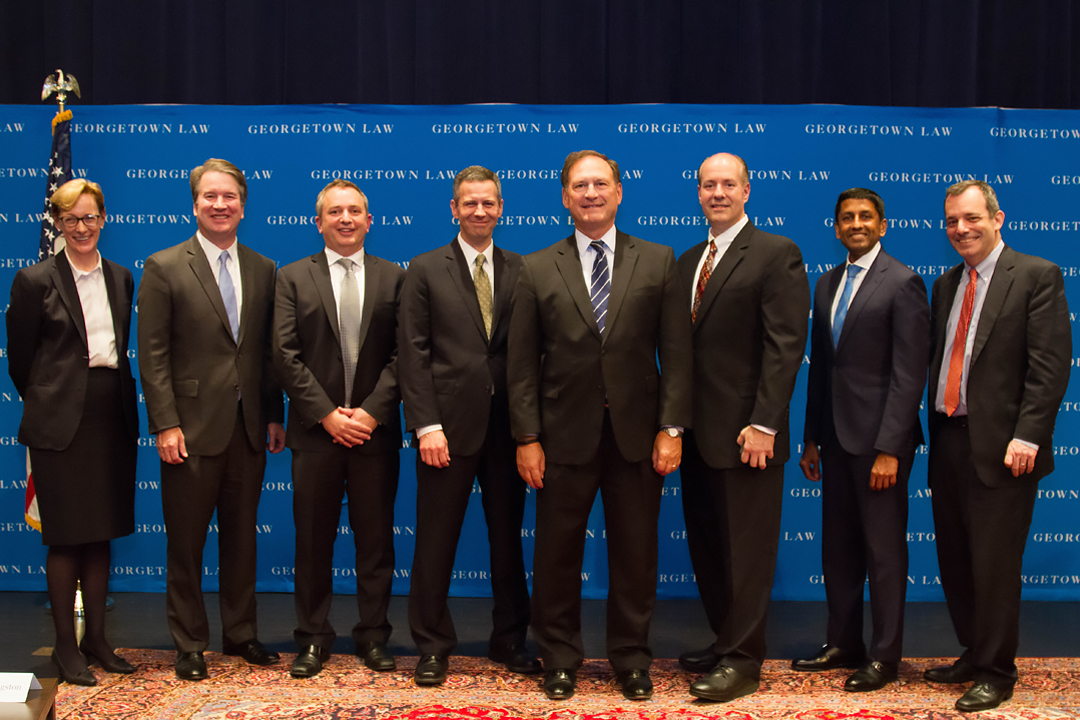The Georgetown Law Journal held a two-day symposium focusing on The Law of Nations and the United States Constitution, a recent book published by Bradford R. Clark, William Cranch Research Professor of Law, and A.J. Bellia, the O'Toole Professor of Constitutional Law at Notre Dame. Leading constitutional and international law scholars, along with prominent federal judges—including Supreme Court Justice Samuel Alito—discussed the book and its implications for the role of customary international law in U.S. courts. Harvard Law School Dean John Manning moderated the judges panel, consisting of Justice Alito and Judge David Barron of the U.S. Court of Appeals for the First Circuit, Judge Debra Livingston of the Second Circuit, Judge Brett Kavanaugh of the D.C. Circuit, and Judge Sri Srinivasan of the D.C. Circuit.
"When an issue of customary international law comes up, it's very likely to come up before a judge who has little, if any, prior experience dealing with the subject, and therefore it's very important for those judges to have access to materials that can give them a quick course so that they can get up to speed," Justice Alito said. "This is one of the many ways in which I think the book will make a major contribution." The role of customary international law in U.S. courts has been the subject of one of the most important and high-profile legal debates of the last few decades. The book provides a historical account of how the Constitution was designed to interact with distinct kinds of international law, and how U.S. courts have treated customary international law throughout U.S. history. It further develops the implications of this account for how judges should treat international law today. The book also offers a new lens through which judges, and anyone interested in constitutional governance in the United States, can analyze the role and status of customary international law in U.S. courts.
The conference on the book began on November 2 with a panel entitled, "The Law of Nations and the Constitution—the Judicial Perspective." Dean Manning moderated a discussion of the book among several of the most prominent federal appellate judges in the United States. On day two of the conference, three panels of leading constitutional and international law scholars considered the book's historical account and its modern implications. Participants included Curtis Bradley, Duke; Bill Dodge, Davis; Jack Goldsmith, Harvard; David Golove, NYU; John Harrison, Virginia; Dan Hulsecosch, NYU; Marty Lederman, Georgetown; Tom Lee, Fordham; Chimene Keitner, Hastings; Mike Ramsey, San Diego; Paul Stephan, Virginia; David Stewart, Georgetown; and Amanda Tyler, Berkeley.
Georgetown Law Journal Editor in Chief Jennifer Ong said the lineup of panelists was the culmination of nearly a year's worth of work. "We worked very closely with Professors Clark and Bellia, and we were very fortunate that the judges and scholars were willing to take part in this event," she said. "I think their willingness to participate in a symposium on customary international law shows the importance of the issue and the groundbreaking framework that the professors put forth in their book. We're looking forward to seeing the conversation expand to other scholars in the field and continue in the future."
"Professor Bellia and I worked for several years together on the book, and we are gratified that the Georgetown Law Journal chose to hold a symposium on our scholarship, and that so many distinguished scholars and jurists took the time to engage our work," Professor Clark said. "We look forward to the publication of these papers, and to continuing the scholarly debate."
In connection with this event, GW Law and Notre Dame Law co-hosted a gala symposium dinner on November 2 to recognize Professor Clark and Bellia's work, and to thank Justice Alito and the other distinguished participants in the symposium. GW Law Dean Blake D. Morant welcomed the participants and was joined by GW President Thomas LeBlanc and GW Law alumni William P. Barr, JD '77, Bobby R. Burchfield, JD '79 , and Gregory G. Garre, JD '91. "The global nature of the marketplace compels an understanding of international laws and policies," Dean Morant said. "Professors Clark and Bellia's pathbreaking book and the symposium honoring their work constitute seminal contributions to the ongoing dialogue regarding the salience of international law in U.S. judicial decision making."


